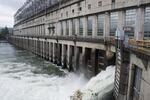
The first powerhouse of the Bonneville Dam, 40 miles east of Portland, on the Columbia River.
WikiCommons
On Wednesday, dozens of scientists made their case for spilling more water over dams in the Columbia River Basin.
In a letter sent to Northwest lawmakers in Congress, they outlined and "reaffirmed" scientific evidence that more spill is critical to protecting threatened and endangered salmon and steelhead.
Earlier this year, U.S. District Court Judge Michael Simon ordered Columbia River dam managers to spill more water by 2018 to help fish protected under the Endangered Species Act.
But several Northwest lawmakers are aiming to block that order with a bill they've introduced in Congress. Spilling more water over dams reduces the amount of hydropower produced and raises the price of electricity.
The federal legislation is primarily intended to prevent the removal of four Snake River dams, but it would also overturn Judge Simon's order for more spill.
Now, it appears 47 Northwest scientists are pushing back against that effort.
"Some in the region have questioned the value of spill in reducing the risk to threatened and endangered fish associated with passage through the federal hydro system," their letter states. "This letter summarizes existing science on the topic and unequivocally supports expanded spill as an effective near-term measure to better protect ESA-listed populations."
David Cannamela, a retired Idaho fisheries biologist and one of the signatories of the letter, said science shows young salmon need a flowing river to make it to the ocean.
"The judges have made it clear they’re reading the science correctly: Flow is necessary to get those fish out," he said. “The best available option for ensuring safe passage for these juvenile salmonids is spill, which is one action we can take that makes the river more like a river and less like a pond.”
In their letter, the scientists argue threatened and endangered fish need as much spill as the law allows – and maybe even more – as soon as possible. They advocate for an experiment that would increase spill above the legal limit for the amount of gases that are allowed in the water so scientists can study the effects on fish.
Total dissolved gas limits are designed to prevent harmful impacts to fish, but the scientists argue testing those limits is "fully justifiable today, from a scientific perspective."
